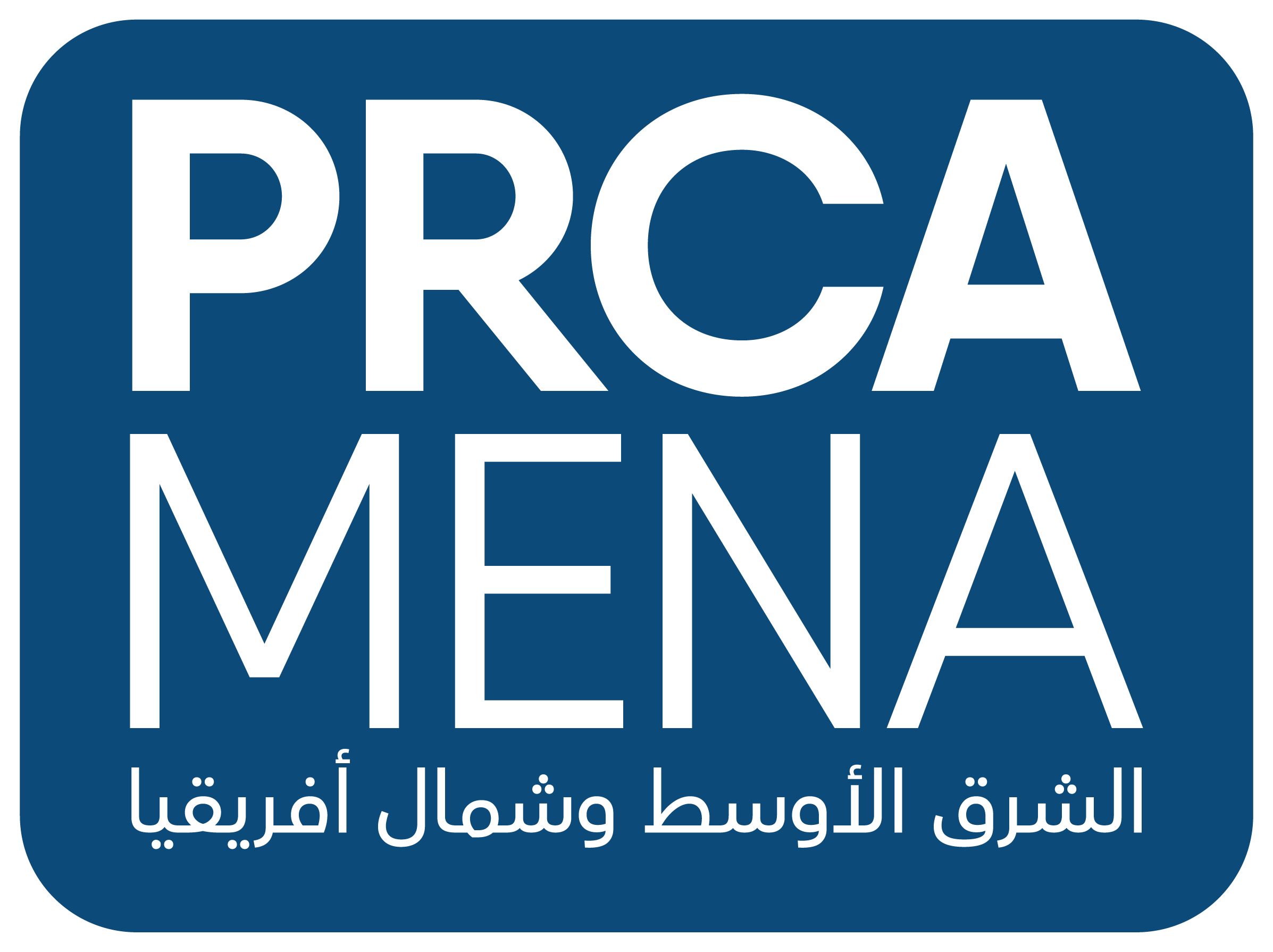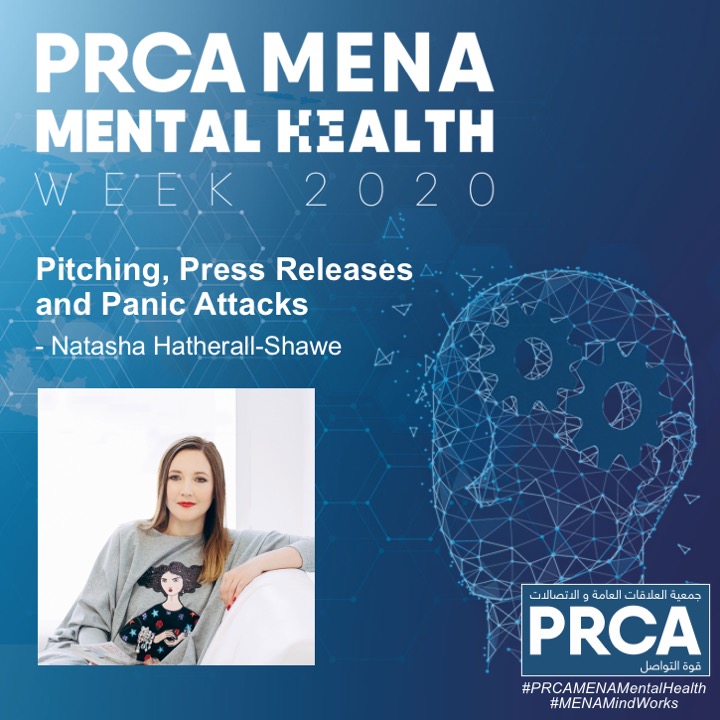PRCA MENA MHW – Pitching, Press releases & Panic Attacks by Tash Hatherall, Founder and CEO of TishTash
I was sat on the toilet cubical floor, tears were rolling down my cheek and I was struggling to breathe but trying not to make too much noise at the same time so no-one heard me. My heels were thrown off and my bangle lay next to them and I was sure I’d sat in a pool of water or something on the floor in my dress, but I couldn’t worry about that right now. I started scrambling around in my handbag looking for the Xanex tablet I always kept in there “just in case”, eventually finding it and gulping it down. I lent back on the door and breathed, trying to remember all the techniques I had been taught as I waited for the “magic pill” to work its wonder and get me upright again. About 15 minutes later, my breathing was near normal, I got myself off the floor, out of the cubical and looking at my phone realized I was so late for where I needed to be. A dash of concealer, powder and a pop of lipstick, spritz some perfume on as that always made me feel like I could handle anything, brush hair, straighten clothes and then I walked back into the office that I owned and into the team of 20 something professionals that I employed like nothing ever happened and I smiled. And no-one was ever the wiser.
I’m Tash. I own TishTash Marketing and Public Relations, a busy independent comms agency in the Middle East and this is my reality living and working with anxiety and panic attacks.
I run a busy agency and we work in an industry voted the 5th most stressful in the world that demands and requires a smile at all times. And I’m not alone. I wish I could tell you the number of people I know in our industry that share experiences like this with me. I know of more than 10 people in our industry here currently carrying Xanex “just in case”, working it through in therapy or those people that know there is a “problem” but can’t face dealing with it just yet, as you know, they’re too busy and it’s an extra thing to add to the to-do list. And these are just the ones who have opened up and shared this with me.
As World Mental Health Day rolls around again this month, and in an especially challenging time mentally for many of us in Covid times, I wanted to take a moment to share my story with you openly and honestly and give a voice to it because according to the World Health Organization (WHO), 1 in 13 of us across the globe now suffers from anxiety. Anxiety disorders are the most common mental illness and are highly treatable, yet only 37% of these suffering actually go on to receive treatment. I’m sure if there was research specifically in our industry it would be far higher than that! Don’t you agree?
So, I’m not alone and you’re not alone if you are struggling with anxiety or mental health concerns, and I do hope that knowing this provides you with some degree of comfort. Secondly, as with everything, if we talk about the uncomfortable and difficult things, we open up a place where more people can share and talk about it with less fear of judgement and less stigma surrounding it and whilst ultimately we want to get to a place where we’ve worked through it and have better strategies for dealing with it, as I’ve come to see, it’s one of those things that doesn’t just go away forever, it remains there and now and again rears its head however much therapy you’ve had and no matter how good you’ve become at “managing” it.
I only started having panic attacks and experiencing debilitating anxiety after I opened my business. Whilst my entrepreneurial journey has been amazing and wonderful on so many levels, nothing prepared me for the lows and the depths it took me to also. As we grew as a business and our expenses and liabilities and the size of clients and their demands increased too, my mental health struggles began. I was only officially diagnosed with an anxiety disorder 4 year ago, although if I look back in my life the signs were always there since I was a child. I have always been a worrier, and this has been a constant in my life since I can remember. But as I grew up, the things to worry about got bigger, culminating in a lot of responsibility and a constant sense of feeling overwhelmed that comes with owning a business. At my worst I was having 6 panic attacks a day, I struggled to function, and I ended up on a very high dose of medication to get through the days.
I love my job, I love our industry and I’ve spent over 20 years of my life in it now and I think I’m pretty good at it, but it’s tough and it isn’t all smiles, parties and glamour and we need to be open and honest about this. I sometimes describe myself as a front liner of a different sort as I get home from work feeling battered and bruised and just need to hide from the world.
To anyone out there reading this that it resonates with, whilst I do believe nothing replaces getting professional help and I personally go to Lighthouse Arabia who are simply amazing and I rave about the work they do daily, I also wanted to share some tips that I have found have helped me over the years:
· Firstly, I’ve said it already, but I’ll say it again – you need to remember that this is nothing to be ashamed or embarrassed by. It will happen to so many people at some time in your life – so put your pride to one side! Your focus needs to be on you. And if anyone judges you because of this – then it’s their issue and not yours.
· You need to realise the signs as early as you can. I know this isn’t always possible, but if you sense there is the smallest chance of a panic attack or anxiety attack, remove yourself from the current situation and try and get to a “safe space”. This could be the bathroom, your car, your office if you have your own or even home if close. Often I feel worse if I am in an environment where I don’t know people, it’s new and I have no support network and having a panic attack publicly is just unimaginable. I have had a panic attack in my office before and had to be carried out by my husband – yes not my finest moment, but it is what it is. I own it!
· Find simple rituals that make you feel better when you feel “on the edge” and do them. For me, this includes standing in a hot shower, even for 30 minutes if need be. I’m a big fan of aromatherapy oils and I love pulse point roll ons and pillow sprays. I also remove myself from the situation and watch something trashy on Netflix. And as strange as it sounds, I find lying on a rug on the floor just looking up at the ceiling super soothing!
· If you need medication, at least initially to get you back on your feet – take it. I was very anti-medication and have always preferred natural alternative therapies, but there came a time for me where I had to accept it and it was the best decision I made as it got me in a good place again a lot quicker than if I hadn’t. For me, getting off medication was a priority and I worked with Lighthouse to do this and now I have my emergency stash of Xanex only and just knowing it is there should I ever need it helps.
· It may sound like a cliché, but spending time learning breathing techniques is worth the investment. There are lots of YouTube videos and online resources to help here too. I like apps such as Calm too.
· Avoid extra stimulants like alcohol or caffeine as I find these make me worse, even if initially they may seem to help.
· Sleep generally can fix most things. I find that if I am getting 8 hours of sleep a night, I cope with everything better.
· You may not want to hear it (I don’t always!) but exercise helps too. Even a short walk each day.
· Talk about it – I am lucky that I have a good circle of friends, as well as professional help and I talk openly about it a lot. It really helps. I’m not sure how open your company/boss is to mental health topics if you work for someone else, but I have been very clear to my team about mental health days and the importance of looking after yourself and they have an open door to always share how they are feeling and ask for support and it makes such a difference.
I’ve chatted on enough, so I’ll head off now, but I wanted to share with you an article that I read recently that really resonated with me as it said, “my anxiety is my strength, not my weakness”. My anxiety and worrying and sweating the small stuff, the fact I care and have great empathy and understanding of others has got me this far and I think I’ve done pretty well. Many of the attributes of anxiety have helped me a great deal – so they are many positive side effects of anxiety too and being diagnosed with anxiety is definitely not the end to your career or life. If we own it and all it gives us instead of what it takes away, then it’s a very different conversation and way of looking at life and I’m all for that.




